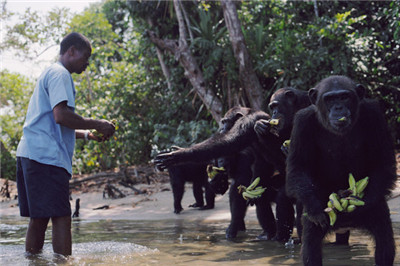(单词翻译:单击)
After about 30 years of using a colony of chimpanzees in Liberia for biomedical research, which ended 10 years ago, the New York Blood Center has now withdrawn all funding for them, prompting animal welfare groups to urge the center to reconsider its decision.
在利用利比里亚的一群黑猩猩进行了大约30年的生物医学研究后,纽约血液中心(New York Blood Center)撤消了对它们的所有资助,促使多家动物福利团体要求该中心重新考虑其决定。该研究项目已于10年前终止。
For now, the Humane Society of the United States is supporting the chimps, which are owned by the government of Liberia, and is starting a campaign to raise funds for them.
美国人道协会(Humane Society of the United States)暂时在为这群归利比里亚政府所有的黑猩猩提供资金,并在发起为它们筹集资金的活动。

“The New York Blood Center is abandoning 66 chimpanzees and leaving their fate to chance,” said Wayne Pacelle, president of the society. The cost of caring for and feeding the chimps is about $30,000 a month.
“纽约血液中心遗弃了这66只黑猩猩,让它们听天由命,”该协会会长韦恩·帕赛尔(Wayne Pacelle)说。照料和饲养这些黑猩猩的费用为每月3万美元(约合18.6万元人民币)左右。
Brian Hare, an anthropologist and primatologist at Duke University who is also known for his studies of dog intelligence, started a petition on Change.org to urge people to contact the New York Blood Center.
杜克大学(Duke University)人类学家、灵长目动物学家布赖恩·黑尔(Brian Hare)在Change.org网站上发起了请愿活动,敦促民众联系纽约血液中心。黑尔还因有关犬类智能的研究而闻名。
Mr. Hare said in an email, “I have studied great apes for 20 years in all contexts across the globe — labs, zoos, sanctuaries, the wild” and others. “Never, ever have I seen anything even remotely as disgusting as this.”
黑尔在邮件中表示,“我研究类人猿已有20年的时间,见识过全球各地的各种环境——实验室、动物园、自然保护区、野外”等等地方。“但从未遇到过这么令人厌恶的事情。”
Victoria O’Neill, a spokeswoman for the blood center, said officials there would not grant interviews regarding the issue because “there is arbitration going on, brought by the Liberian government.”
纽约血液中心的发言人维多利亚·奥尼尔(Victoria O’Neill)表示,中心的官员不会就这一问题接受采访,因为“利比里亚政府提请了仲裁,目前正在处理中。”
A brief statement from the center said it had withdrawn support after “a long period of unproductive discussions with the Liberian government about their responsibilities in this regard, during which time we incurred millions of dollars of costs.”
该中心发表简短声明称,在决定撤消资助之前,“与利比里亚政府就他们在此事上的责任进行了长期的无效讨论,在此期间,我们承担了数百万美元的费用。”
Ms. O’Neill said the center “never had any obligation for care for the chimps, contractual or otherwise.”
奥尼尔表示,该中心“从来都没有照料这些黑猩猩的任何责任,无论是合同义务,还是其他协议。”
The news site Front Page Africa first reported on the uncertain fate of the chimps last week.
新闻网站“非洲头版”(Front Page Africa)上周首先对这群黑猩猩未知的命运进行了报道。
Fatorma K. Bolay, director of the Liberian Institute for Biomedical Research in Charlesville, which cares for the chimpanzees — who live uncaged on six mangrove islands — said that the institute cannot afford to pay for their food and care.
在查尔斯维尔的利比里亚生物医学研究所(Liberian Institute for Biomedical Research)担任所长的法蒂玛·K·博莱(Fatorma K. Bolay)表示,该机构负担不起这群黑猩猩的食物和照料费用。目前这个研究所正在照料这批自由居住在六座红树林岛上的黑猩猩。
He said the humane society has been paying for food and repairs since March 6, when funding from the blood center stopped, but that caretakers are working for free.
博莱博士称,在血液中心停止提供资助后,人道协会从3月6日开始承担食物及修理所需的费用,但护理员都是在免费工作。
“Why would they walk away from the animals?” Dr. Bolay said about the blood center’s funding withdrawal. “We have to find a solution to take care of these animals.”
“他们为何要抛弃这些动物?”提到血液中心的撤资决定时,博莱问道。“我们需要想出办法来照料它们。”
The history of the research center, called Vilab II, dates back to 1974, when the blood center contracted with the institute to do research primarily on the hepatitis virus, which survives in blood and posed a threat to the safety of the supply of donated blood. Around this time, the United States banned importation of chimpanzees caught in the wild.
Vilab II研究中心的历史可以追溯到1974年。当时纽约血液中心与该所签订合同,主要开展有关肝炎病毒的研究。这一病毒存活在血液中,对捐献血液的供应安全造成威胁。就在那个时间点前后,美国开始禁止引进在野外捕捉的黑猩猩。
By 2005, the blood center had stopped research on the chimps and started trying to make arrangements for their long-term care. A 2014 Vice documentary, Island of the Apes, chronicled the history of the lab and the islands on which the chimps now live.
到2005年,血液中心停止了有关这群黑猩猩的研究,开始尝试安排长期照料它们的事宜。Vice媒体公司2014年推出的纪录片《黑猩猩之岛》(Island of the Apes)记录了这座实验室及黑猩猩目前所居住的岛屿的发展历史。
A decade ago, the blood center appeared to be committed to caring for the chimps in retirement. Alfred M. Prince, director of the Vilab II project for the blood center, wrote an article in the American Society of Primatologists Bulletin in December 2005, seeking a foundation to take over care of the chimps. Dr. Prince wrote that the blood center “recognizes its responsibility to provide an endowment to fund the Sanctuary for the lifetime care of the chimpanzees.”
10年前,纽约血液中心似乎做出了照料这群不再参加研究项目的黑猩猩的承诺。血液中心的Vilab II项目负责人艾尔弗雷德·M·普林斯(Alfred M Prince)于2005年12月在《美国灵长目动物学家协会通报》(American Society of Primatologists Bulletin)发表文章,寻找基金会来接管照料黑猩猩的工作。普林斯写道,血液中心“承认有责任提供资金来维持为黑猩猩提供终身照料的保护区。”
But Ms. O’Neill said in an email that this was Dr. Prince’s opinion and was “not authorized or approved” by the blood center. She added that the center “did not ever establish any endowment for animal care, chimpanzees included.”
不过,奥尼尔在邮件中表示,这是普林斯个人的观点,“未经”血液中心的“授权或认可”。她还表示,中心“从未设立照料动物的专项资金,黑猩猩也不例外”。
In 2007, the blood center withdrew its staff from the institute in Liberia, but continued to support the chimpanzees. In January, Dr. Bolay said the blood center informed the institute that March 5 would be the last day of support. Previous negotiations about the chimps’ future had broken down, Dr. Bolay said.
2007年,纽约血液中心撤出了派驻利比里亚这座研究所的工作人员,但继续为黑猩猩提供资金。博莱在今年1月表示,血液中心告知研究所,3月5日将是他们提供资助的最后一天。博莱称,之前有关这群黑猩猩未来命运的谈判以破裂告终。
The humane society hired Agnes Souchal, general manager of the Sanaga-Yong Chimpanzee Rescue Center in Cameroon, to assess the state of the chimpanzees. She said in an interview that there is little to no natural food on the islands and the animals were completely dependent on their caretakers, who were feeding them every other day.
美国人道协会聘请了喀麦隆萨那加-杨黑猩猩援救中心(Sanaga-Yong Chimpanzee Rescue Center)的总管昂内斯·苏莎尔(Agnes Souchal)来评估这群黑猩猩的状态。她接受采访时表示,岛上几乎没有天然食物,黑猩猩完全依靠护理员养活,每隔一天得到他们的一轮喂食。
The feeding schedule had not changed, but there was more food in the past, she said.
她说,饲喂安排没有变,但过去会喂更多的食物。
She said she found chimpanzees “without water.” There is no fresh water on the islands and the water system had broken down. Since Ms. Souchal’s visit, it has been fixed with funds from the United States and international humane societies.
她表示,自己发现黑猩猩“没有水喝”。岛上没有淡水,而供水系统出现了故障。在苏莎尔访问这些岛屿后,几家美国及国际人道团体提供了资金,修复了供水系统。
Kathleen Conlee, vice president for animal research at the Humane Society of the United States, said the group is starting a crowdfunding effort on the site GoFundMe to raise about $150,000. “Our long-term goal is to provide these chimpanzees with true sanctuary,” she said. She said at least 16 other animal welfare groups are also calling on the center to reinstate funding.
美国人道协会动物研究部门的副主管凯瑟琳·康利(Kathleen Conlee)表示,该组织打算在GoFundMe网站上进行众筹,希望能募集到15万美元。“我们的长期目标是为这些黑猩猩提供真正的保护区,”她说。她表示,至少还有其他16家动物福利组织也在呼吁血液中心恢复提供资金。
Ms. Conlee said, “You cannot just use chimps like this and just abandon them and get away with it.”
康利说,“不能这样利用黑猩猩,然后抛弃它们,还不用承担任何后果。”


